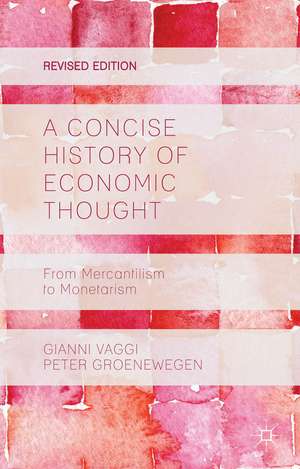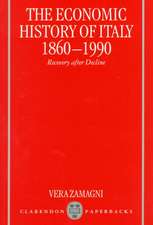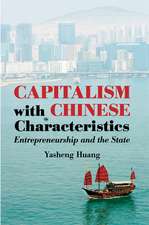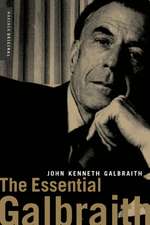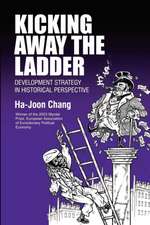A Concise History of Economic Thought: From Mercantilism to Monetarism
Autor G. Vaggi, P. Groenewegenen Limba Engleză Paperback – 29 apr 2014
| Toate formatele și edițiile | Preț | Express |
|---|---|---|
| Paperback (2) | 358.40 lei 6-8 săpt. | |
| Palgrave Macmillan UK – 29 apr 2014 | 358.40 lei 6-8 săpt. | |
| Palgrave Macmillan UK – 3 dec 2002 | 584.43 lei 6-8 săpt. |
Preț: 358.40 lei
Nou
Puncte Express: 538
Preț estimativ în valută:
68.58€ • 71.61$ • 56.63£
68.58€ • 71.61$ • 56.63£
Carte tipărită la comandă
Livrare economică 15-29 aprilie
Preluare comenzi: 021 569.72.76
Specificații
ISBN-13: 9781137372451
ISBN-10: 1137372451
Pagini: 360
Ilustrații: XIX, 339 p.
Dimensiuni: 140 x 216 x 21 mm
Greutate: 0.5 kg
Ediția:Revizuită
Editura: Palgrave Macmillan UK
Colecția Palgrave Macmillan
Locul publicării:London, United Kingdom
ISBN-10: 1137372451
Pagini: 360
Ilustrații: XIX, 339 p.
Dimensiuni: 140 x 216 x 21 mm
Greutate: 0.5 kg
Ediția:Revizuită
Editura: Palgrave Macmillan UK
Colecția Palgrave Macmillan
Locul publicării:London, United Kingdom
Cuprins
Foreword; S.G.Medema PART I: CLASSICAL POLITICAL ECONOMY, 1600-1870 1. Seventeenth Century Pioneers 2. Development in French Economics 3. Towards a Mature Classical Political Economy 4. The First Full Systems of Classical Political Economy 5. The 'Golden Age' of Classical Political Economy PART II: MODERN DEVELOPMENTS, 1870-1960 6. The First Generation 7. The Development of Marginalist Economics: Distribution and Capital Theory 8. Pioneers of Macro-Economics 9. Further Developments in Micro-Economics 10. The Foundations of Modern Macro-Economics
Recenzii
Praise for the the first edition:
'A Concise History of Economic Thought is exactly the book I have always wanted to prescribe for undergraduate classes in the history of economic thought. Written by two eminent scholars, it provides a clear convincing outline of the principal developments in our discipline combined with clear, absorbing accounts of the major episodes, contributors and their contributions on the way. It is an authoritative and definitive text, a wonderful read, an example of mature scholarship at its best, backed up by well chosen additional readings in each chapter.' - G.C. Harcourt, Jesus College, Cambridge, UK
'This book, written by two eminent historians of economics, is a definitive roadmap through the development of economic thought over the past 400 years. Its convincing and transparent structure introduces each milestone along the way in the form of accessible vignettes of the key contributions to classical political economy and modern economics. As a unique feature, each of these more than thirty chapters stands on its own and can be read individually. Closely working with relevant sources, and with aptly chosen suggestions for further reading at the end of each chapter, this is an ideal textbook and concise overview of the field.' - Matthias Klaes, Head, Centre of Economics and Management, Keele University, UK
'This book presents a comprehensive history of theoretical economics from the mercantilist period to roughlythe middle of the 20th century. The treatment of the material is thorough, well organized, clear and rigorous...an excellent resource.' - Gary Mongiovi, St John's University, USA
'A Concise History of Economic Thought is exactly the book I have always wanted to prescribe for undergraduate classes in the history of economic thought. Written by two eminent scholars, it provides a clear convincing outline of the principal developments in our discipline combined with clear, absorbing accounts of the major episodes, contributors and their contributions on the way. It is an authoritative and definitive text, a wonderful read, an example of mature scholarship at its best, backed up by well chosen additional readings in each chapter.' - G.C. Harcourt, Jesus College, Cambridge, UK
'This book, written by two eminent historians of economics, is a definitive roadmap through the development of economic thought over the past 400 years. Its convincing and transparent structure introduces each milestone along the way in the form of accessible vignettes of the key contributions to classical political economy and modern economics. As a unique feature, each of these more than thirty chapters stands on its own and can be read individually. Closely working with relevant sources, and with aptly chosen suggestions for further reading at the end of each chapter, this is an ideal textbook and concise overview of the field.' - Matthias Klaes, Head, Centre of Economics and Management, Keele University, UK
'This book presents a comprehensive history of theoretical economics from the mercantilist period to roughlythe middle of the 20th century. The treatment of the material is thorough, well organized, clear and rigorous...an excellent resource.' - Gary Mongiovi, St John's University, USA
Notă biografică
Gianni Vaggi is Professor of Development Economics at the University of Pavia, Italy where he is also the Director of the European School of Advanced Studies in Cooperation and Development. He has published a large number of articles as well as two books: The Economics of Francois Quesnay and From the Debt Crisis to Sustainable Development.
Peter Groenewegen is Emeritus Professor at the University of Sydney, Australia. He has published a number of books on the history of economic thought, including a widely acclaimed biography of Alfred Marshall, a collection in translation of Turgot's major writings on economics, and three volumes of his essays on the history of economics. As Director of the Centre for the Study of the History of Economic Thought from 1989 to 2003, he edited several volumes of conference proceedings on subjects ranging from economics and ethics, to women and economics, and physicians and political economy, as well as a series of reprints of economic classics. In 2005 his services to the subject were recognised by both the History of Economics Society which named him as one of its distinguished fellows, and the European Society of the History of Economic Thought which made him one of its honorary members. In 2010, Peter Groenewegen was made a Distinguished Fellow of the Economic Society of Australia, and of the History of Economic Thought Society in Australia, the last of which he helped to found in 1981.
Peter Groenewegen is Emeritus Professor at the University of Sydney, Australia. He has published a number of books on the history of economic thought, including a widely acclaimed biography of Alfred Marshall, a collection in translation of Turgot's major writings on economics, and three volumes of his essays on the history of economics. As Director of the Centre for the Study of the History of Economic Thought from 1989 to 2003, he edited several volumes of conference proceedings on subjects ranging from economics and ethics, to women and economics, and physicians and political economy, as well as a series of reprints of economic classics. In 2005 his services to the subject were recognised by both the History of Economics Society which named him as one of its distinguished fellows, and the European Society of the History of Economic Thought which made him one of its honorary members. In 2010, Peter Groenewegen was made a Distinguished Fellow of the Economic Society of Australia, and of the History of Economic Thought Society in Australia, the last of which he helped to found in 1981.
